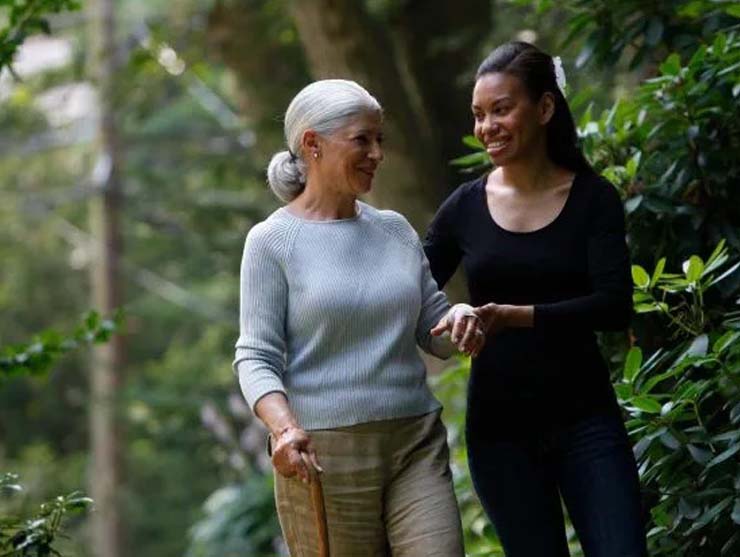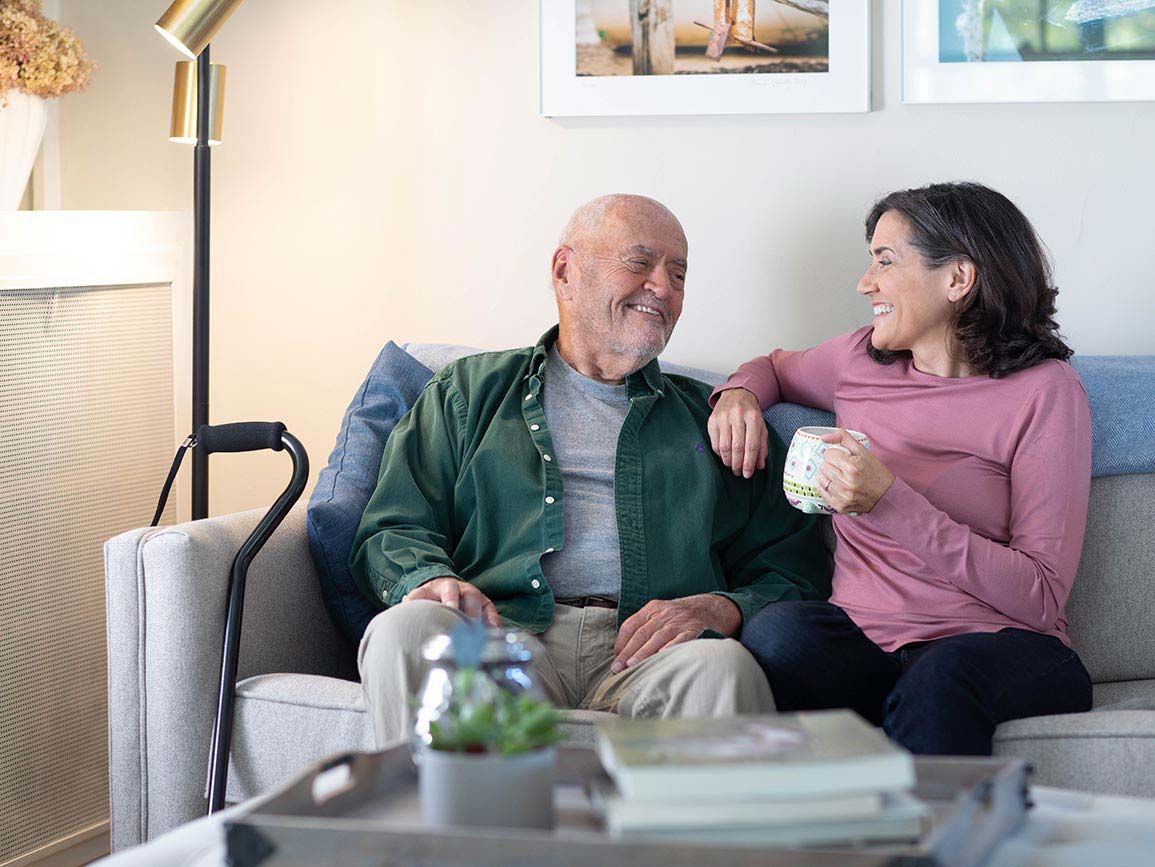Much like choosing the right day care for your toddler, selecting the best adult day care to address your family’s needs is key to supporting an aging loved one.
But first, what exactly is adult day care? And how can you tell if it’s right for your family?
Adult day care, often referred to as ADS (Adult Day Services), is a supervised community program in which seniors receive social, emotional, and physical assistance from qualified medical professionals as a means to keep them living independently for as long as possible.
Much like the name suggests, adult day care provides a safe, structured environment for older adults who cannot be alone for long periods due to health or cognitive issues like dementia or Alzheimer’s. These programs offer social interaction, physical activities, meals, medication management, and sometimes health services like therapy or even medical monitoring.
Types of adult day care programs:
Generally, adult day care programs can be categorized into two main types:
- Social Adult Day Care: These programs primarily focus on providing social interaction and recreational activities for seniors. They offer a supportive environment where older adults can socialize, participate in group activities, and enjoy meals and snacks. These programs are suitable for seniors who are relatively independent but may experience social isolation or loneliness.
- Medical Adult Day Care: These programs provide a higher level of care and are designed for seniors with more complex needs. They offer a range of services, including:
- Nursing care: Assistance with medications, wound care, and other medical needs.
- Rehabilitation services: Physical, occupational, and speech therapy.
- Cognitive stimulation: Activities to help maintain cognitive function and prevent decline.
- Respite care: Temporary relief for family caregivers.
Medical adult day care programs are often staffed by licensed medical professionals, such as nurses and therapists. They are suitable for seniors who require more intensive care and support than what social adult day care can provide.
Additional Types:
- Specialized Adult Day Care: Some programs cater to specific populations, such as seniors with dementia, Alzheimer's disease, or other cognitive impairments. These programs offer specialized care and activities designed to meet the unique needs of these individuals.
- Faith-Based Adult Day Care: Some programs are affiliated with religious organizations and may incorporate spiritual or religious elements into their programming.
Why is adult day care important?
Providing around-the-clock support for aging seniors continues to be a significant responsibility for many families today with working adults having to balance their jobs alongside their caregiving responsibilities. And these custodians supporting older family members are a reflection of both the growing aging population and the ongoing need for quality elder care.
Caregiving responsibilities often entail assisting with daily activities, managing medical tasks, and providing emotional support. It’s a full-time job for those who usually have full-time jobs of their own along with families to raise.
Adult day care is ideal for aging loved ones who are able to live independently but need extra support and supervision. It also exists to give caretakers a break and support them in their efforts to continue their careers without major disruption.
Adult day care staff: the caretakers
Most adult day cares have a combination of licensed medical professionals, nursing assistants, and clinical social workers. Knowing that you can drop your loved one off for the day into the hands of qualified professionals, medical and otherwise, can make a huge difference to one’s view of caregiving. These programs are designed to stimulate mental clarity, engage senses, and provide seniors with a stimulating and dynamic social setting.
How to choose a quality adult day care
Assess staff qualifications, services offered, and participant demographics. Those three key factors will help you hone in on the right adult day care for your loved one. Additionally, schedule visits with any center you’re considering to observe activities and suitability for your family member’s specific needs.
Finding the right adult day care is similar to a preschool or college search. It requires time, research, and following your instincts. While every center will have its own unique approach to care, only you will know which one will most benefit your family’s needs.
There are over 7,500 ADS centers nationwide, so it’s crucial that families schedule tours, speak with staff, talk to other residents, and make a detailed list of questions tailored to their senior’s mental and physical requirements in order to choose the best program for them.
If you’re considering adult day care, check out this detailed breakdown from Forbes Health, educate yourself about elder care responsibilities and how adult day care can offer a much-needed reprieve from these responsibilities, and go explore the specifics of your state’s State Unit on Aging (SUA) by visiting Eldercare Locator (.gov) or calling 1-800-677-1116.
The US Department of Health and Human Services website is also a great hub of information with resources listed by state.
When choosing an adult day care program, it's important to consider the specific needs and preferences of your loved one. Factors to consider include:
- Level of care required: Do they need basic social interaction or more intensive medical care?
- Types of activities offered: Are there activities that align with their interests and abilities?
- Staff qualifications and experience: Are the staff members trained and experienced in caring for older adults?
- Location and accessibility: Is the program conveniently located and accessible by public transportation?
- Cost and insurance coverage: What is the cost of the program, and does it accept insurance?
Adult day care program benefits
Adult day care centers provide older adults with structured services such as professional care, engaging social interactions, nutritious meals and snacks, assistance with medications, opportunities for physical activity, and access to certain therapeutic treatments, all within a secure and supervised environment.
The greatest benefits for aging seniors are that adult day cares help improve their socialization, reduce their risks of falling/injury, support their mental health, and delay the need for long-term residential care.
Alongside that, the greatest benefits for caregivers are a relief from ‘chaperoning Dad’ duties, reduced stress, and the ability to properly work or recharge their batteries.
Like the age-old saying goes, You can’t pour from an empty cup.
As essential as it is for aging seniors to feel cared for and supported, it’s equally important that their caregivers receive similar treatment.
Why adult day care could be the right choice
Adult day care is a resource that supports both the well-being of older adults and the mental health of their caregivers, helping families maintain a much-needed balance. Although not suitable for fully independent adults, adult day care bridges the gap between full independence and assisted living or nursing home care. It aids seniors on their aging journey, providing them with a dynamic and vibrant social setting designed to stimulate their senses without requiring them to completely abandon the life they’ve known for so long.
Regardless of which adult day care center you choose, remind your loved one that this transition is for everyone’s benefit and will allow them to continue living independently for as long as possible. It’ll help them form new routines, make new friends, and develop new lifestyle habits that’ll solidify their longevity and joie de vivre.
After all, aging is a privilege and supporting your loved one on this journey is the best gift you can give them.





